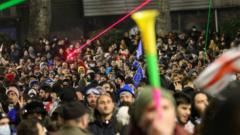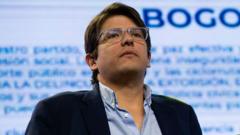In Tbilisi and across Georgia, citizens have rallied for a third consecutive night against the government's decision to pause discussions on European Union membership. The protests have escalated into violent confrontations with riot police, who have deployed water cannons and tear gas in response. Allegations of electoral fraud have sparked discontent, with opposition parties calling for new elections and international oversight as the nation grapples with accusations of undermined democracy.
Protests Erupt in Georgia Over Halted EU Accession Talks

Protests Erupt in Georgia Over Halted EU Accession Talks
Thousands of Georgians are protesting the government's suspension of EU accession negotiations, leading to clashes with police amid rising tensions and allegations of electoral fraud.
Protests in Georgia erupted for the third consecutive night as citizens expressed their outrage over the government’s suspension of negotiations to join the European Union. Demonstrations have spread beyond Tbilisi to cities including Batumi, Kutaisi, and Zugdidi, with demonstrators gathering around the parliament where police have reinforced their presence due to the escalating tension. Riot police have used water cannons and tear gas to disperse large crowds and maintain order.
In the midst of the protests, Georgia’s pro-EU president, Salome Zourabichvili, asserted to the BBC that she would hold her position until new parliamentary elections were organized. Despite the newly-elected parliament’s move to appoint a replacement on December 14, Zourabichvili labeled the current assembly as "illegitimate," following claims by opposition lawmakers of electoral fraud in last month’s vote.
As civil discontent intensifies, hundreds of civil servants have signed petitions against the government’s decision to pause EU negotiations, asserting that it contradicts the national aspirations of the Georgian people. The situation is further complicated by the resignation of several Georgian ambassadors to European nations, indicating a rift between the government and its diplomatic representation.
The ruling party, Georgian Dream, has been accused of shifting the nation's focus towards Russia instead of maintaining a pro-European stance. After winning the recent elections, the party has faced allegations of vote rigging, leading opposition members to boycott parliament and demand new elections under international oversight. In response, the European Parliament voiced concerns over Georgia’s "worsening democratic crisis," holding the ruling government responsible for exacerbating the situation.
Public outcry continues to grow as demonstrators take to the streets accusing local media, particularly the state broadcaster, of perpetuating government propaganda. Writer and activist Lasha Bugadze emphasized the importance of an independent media that informs the public free from external influences.
The United States has condemned the excessive police response during the protests and urged all parties to maintain peace. Following violent confrontations where over 150 individuals were detained, reports surfaced of clashes between protesters and police, with accusations of injuries on both sides. Prime Minister Irakli Kobakhidze stated that the police had faced violent acts from demonstrators, further escalating tensions in an already fraught political landscape.





















